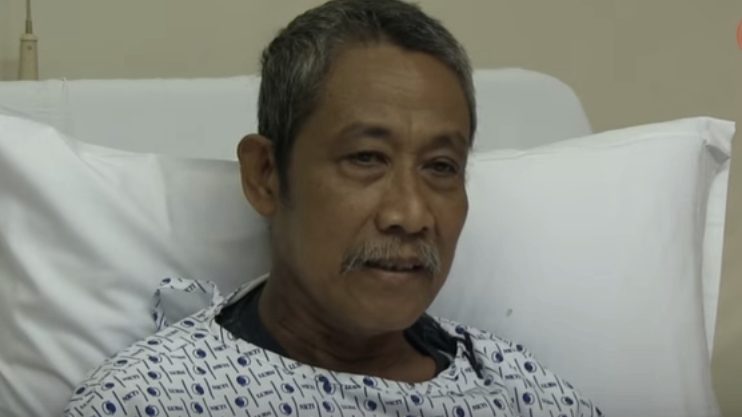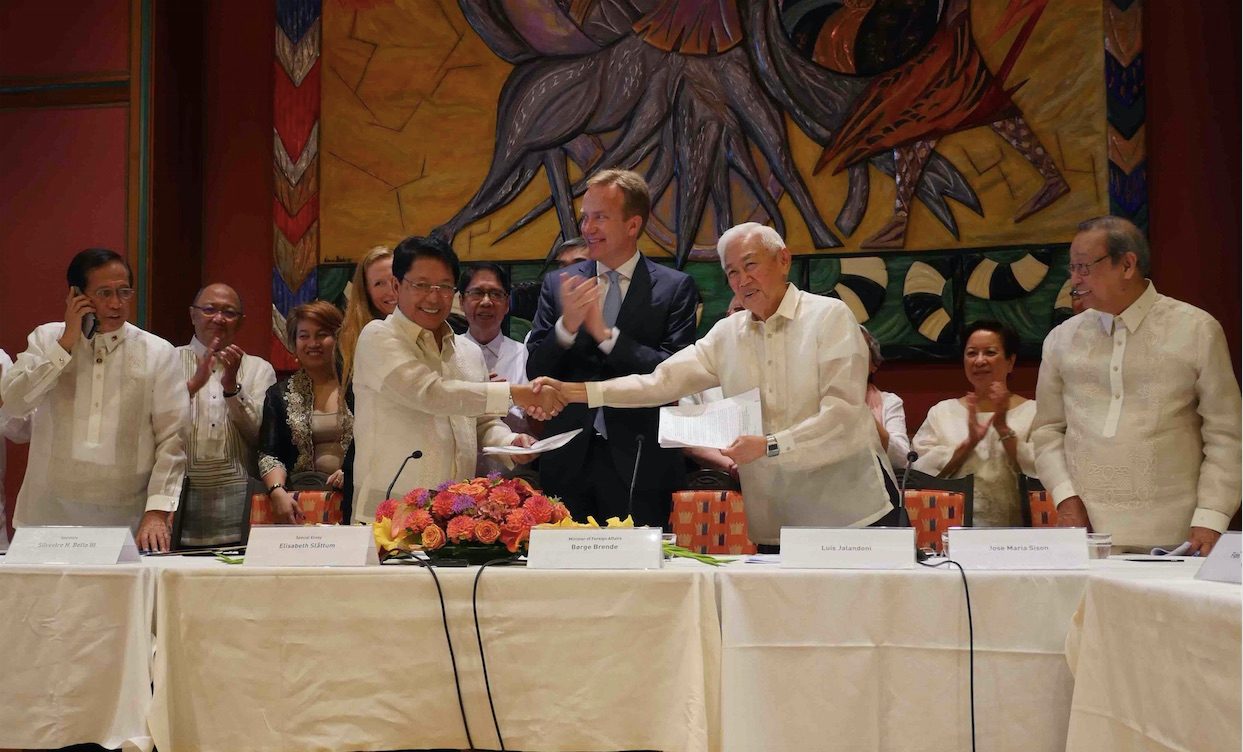SUMMARY
This is AI generated summarization, which may have errors. For context, always refer to the full article.

MANILA, Philippines – A few hours before the historic conclusion of the first round of peace talks between the Duterte administration and the National Democratic Front (NDF) on Friday, August 26, 60-year-old rebel leader Renato Baleros Sr was released from prison.
He was temporarily freed from the Samar provincial jail Friday afternoon, rights group Karapatan announced.
In July, Baleros, a political prisoner from Samar island, was rushed to the National Kidney and Transplant Institute after being diagnosed with a kidney disease and pneumonia. On August 11, he was sent back to the jail where his health condition worsened.
Baleros was one of the political prisoners whose immediate freedom activists have been seeking for on humanitarian grounds.
According to the NDF, Baleros is also one of its peace consultants, and is therefore protected by the Joint Agreement on Safety and Immunity Guarantees (JASIG).
The NDF is representing the Communist Party of the Philippines (CPP) and the New People’s Army (NPA) in the formal peace talks with the government that was held in Oslo from August 22 to 28.
The peace talks seek to come up with important agreements and to push forward the peace process which has been stalled for almost 4 years. (READ: PH, NDF to resume talks, silence guns)
Thank you, President Duterte
At the talks, the CPP-NPA-NDF agreed to declare an indefinite ceasefire, while the government panel agreed to recommend to President Rodrigo Duterte the amnesty for all political prisoners, subject to the approval of Congress. (READ: Document: Agreement between PH and NDF)
To date, of the more than 500 Leftist political prisoners, nearly 40 are elderly while about 125 are sick, including Baleros, according to rights group Karapatan.
When Duterte was on the campaign trail, he promised to reopen peace negotiations with the NDF, giving assurances that he will release all detained political prisoners.
About 20 detained NDF consultants, including top CPP leaders Benito Tiamzon and Wilma Tiamzon, have earlier been temporarily freed so that they could participate in the Oslo talks. (READ: Top NPA leaders go on 1st overseas trip for Oslo talks)
In the joint Oslo statement with government negotiators, the NDF thanked Duterte for “committing to cause the early release of prisoners (as listed by the NDF) who are sick, elderly, overly long detained and women based on humanitarian grounds.”

‘High-value target’
Baleros is considered a “high-value target” by the military in Eastern Visayas. He was detained for charges of murder and frustrated murder, robbery in band and multiple homicide, and arson filed against him. His cases have already been dismissed, except for one murder charge.
But Baleros denied the charges.
“Dahil sa pamumundok ko, ginawang wanted ng military ng gobyerno,” (Because I went underground I was put on the wanted list of the military.)
Rights groups, invoking international human rights law, generally define political prisoners as people jailed because of their political beliefs or activities.
According to Baleros, he and his wife were captured in San Jorge town in Samar while directing NPA relief operations in the province days after Super Typhoon Yolanda devastated the region.
“Si misis dinala doon sa Northern Samar provincial jail. Ako naman, dinala doon sa Eastern Samar provincial jail. Sinampahan ng syempre sa tingin namin gawa-gawang kaso,” Baleros told Rappler.
(My wife was brought to Northern Samar Provincial Jail. I was brought to Eastern Samar Provincial Jail. We were charged with trumped up cases.)
They were captured on November 25, 2013, two weeks after the CPP announced a unilateral ceasefire “in solidarity with the plight of the people after Typhoon Yolanda,” according to the CPP’s Regional Committee in Eastern Visayas.
Tortured during martial law
Baleros was a college student in Tacloban City when he decided to join the NPA during the tumultous martial law period. He was captured in 1974 and was detained until 1980. While in detention, he suffered from various forms of torture.
“Ini-slice nila itong tenga ko. Tapos itong dibdib ko, nag-crack itong mga buto dito. Kaya minsan, nahihirapan akong makahinga. Hanggang ngayon, dala-dala ko yan – yung mga tadyak at bugbog,” he said.
(They sliced off my ear. And my ribs cracked. That’s why, sometimes, I experience difficulty in breathing. Until now, I carry that memory with me – their kicks and punches.)
He endured the pain because he felt he did not have any other choice then but to commit to the revolution happening in the countryside, Baleros recalled.
“During that period, activists vigorously studied and learned from social conditions. And everywhere you go during that time, you will encounter the revolution,” he said in a mix of Filipino and English.
“Class struggle’ and family
Asked how he got involved in the movement, Baleros paused before he shared his painful childhood memories.
Baleros’ father, who was worker from Leyte, married the daugther of his employers from a prominent and well-off family in Samar. His mother’s family despised them because they were against the marriage, he said.
“Every child, because my father was poor, was not recognized by my mother’s family. That’s why the kids – my siblings and myself – were raised by our other grandparents,” Baleros shared.
“Kaya ako may hinanakit sa pamilya din. Parang may class struggle sa loob ng pamilya. Ayun ang isa sa nag-motivate sa akin na kailangan talaga ng pagbabago sa lipunan haggang sa tumanda na lang.
(That’s why I feel resentment toward my family. It seemed like there was class struggle within the family. That was one of the reasons that motivated me to push for social change.)
Closer to freedom
It was Baleros’ first political awakening, a consciousness that he embraced until he aged in the movement that is now seeking peace with the government to address the longest-running insurgency in Asia.
And for him, peace starts with the freedom of those fighting for their political beliefs, which has been a contentious issue in talks with previous administrations.
“Kasi sila naman ay naghahanap ng tunay na pagbabago sa lipunan. Kinukulong sila pagka narinig na sinasabing terorista. Dapat hindi. Dapat tingnan ng gobyerno i-address [kung] ano talaga ang ugat ng problema. Pakinggan sila, hindi dapat ikulong. Kaya dapat palayain ang lahat ng political detainees sa bansa.”
(They also want genuine social change. They are jailed because they’re branded as terrorists. It should not be the case. The government should also look at the root cause of the problem. Listen to them instead of jailing them. So all political detainees in the country should be freed.)
After the unprecedented meeting of minds in Oslo, Baleros and his other comrades are closer to attaining the freedom that they’ve been longing for. – Rappler.com
Add a comment
How does this make you feel?
There are no comments yet. Add your comment to start the conversation.